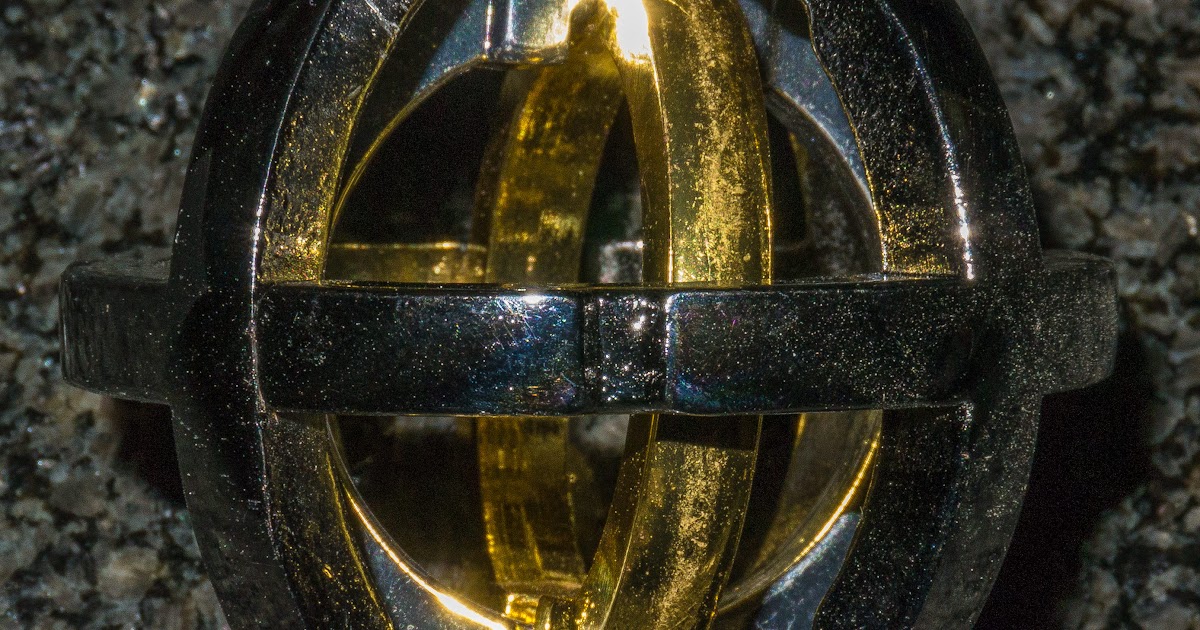I have had the
Total Eclipse
puzzle sitting on my desk next to me in my, ahem, “backlog of puzzles to solve”
for an embarrassingly long period of time. It has been there for over a year!
First it was unsolved because I was too busy, then it remained unsolved because
I couldn’t work it out, then it got, BLUSH,
buried in other puzzles to be solved and finally unsolved because I kept going
round and round in circles. Yes, I am not very bright and I often use the
Einstein’s madness approach of doing the same thing over and over again until
something changes.
I had bought it because it was an Oskar van Deventer design (pretty much
anything he designs is incredible – I really need to get hold of a couple of
copies of the Zigguflat puzzle that has been enjoyed by so many brilliant
puzzlers and combine into one large fabulous N-ary puzzle. I also have been
quite intrigued by the amazing series of
PuzzleMaster’s own metal creations. The
Honeycomb puzzle
recently created as a KickStarter is now available direct from them.
The Toal Eclipse consists of 2 interlocking rings (one chrome and one brass)
inside a black metal cage. It is about 6.5cm in diameter and difficulty score
of 9 on their odd 5 – 10 scale. I think the level is about right. The inner
rings can rotate around inside the cage freely – it is very similar in idea to
the Hanayama Cast Equa (also by Oskar) which
I reviewed
after a huge struggle many years ago. It also share a small similarity
with the Hanayama
Cast Duet
(yes, another Oskar design) reviewed
here. Obviously there needs to be a spot on the cage where the rings can be
released. I found that straight away. The two rings each have a gap in them
which allows them to interlock and presumably is where they disassemble from
the cage. The reason they don’t just come apart is because the gap has a
polarity and straight away it is obvious that the polarity is reversed at the
beginning the process:
The grooves in the cage are on the opposite side to the ring.The
ring obviously needs to be reversed to come off.
It is obvious that the aim is to move the pieces around so that the grooves in
the cage line up with the ring. How do you do that? There are single grooves on
the cage (different orientation to the release grooves) and the rings can be
slid from segment to segment through a maze until the ring has the correct
orientation.
In my multiple previous attempts to solve this puzzle I had found a shortcut –
my copy has a slight flaw where the ring can be passed over the groove in the
cage with the orientation the wrong way around. I realised early on that this
was not right and did my best to avoid it. This turned the puzzle into a
nightmare for me! There are multiple ways to work your way around the cage and
tantalisingly there are a few places where the grooves occur on both sides
allowing either orientation to pass. I found this no help whatsoever! I went
round and round in circles in multiple directions and always ended up back at
the beginning with the ring unable to slide off. OMG! I began to question my
sanity which I have to say Mrs S has done many times. I kept having to put it
down.
Finally lined up!
After the recent tidy up of my hellscape of desk, I suddenly found
the Total Eclipse under a rather large pile and decided at the end of last
week to try again and be finally able to put it away. I took it to work
with me, I played in the evenings and everywhere for a bit. After annoying
everyone for a week with my jingling. I had an Aha! moment and the brass
ring came off. Yessss! The chrome ring was obviously the same and would
need the same path – except I had no recollection of how the first one had
come off. I went round and round in circles again. Each time I was back at
the beginning there was a great offing and blinding. This was a very
difficult puzzle! One more try and I suddenly noticed something about the
possible positions and found a sort of figure of eight sequence that was
able to reverse the polarity of the ring and then I had to make it back to
the double groove position. This was easier said than done but I got there
and could breathe a sigh of relief.
At last!
Having done this, it was time to return to the start position. This should just be a matter of reversing what I had done but of course, I couldn’t remember what I had done! At least this time I had a vague idea of what was required and it only took me a whole day to do it. For just $25CAD this puzzle is a really good buy! It is quite attractive, very tactile as a fiddling object and most importantly, offers a LOT of puzzling without getting hopelessly lost (you always get back to the beginning even when you don’t want to). At over a year to solve it, I have definitely got my money’s worth.
Watch out next week for the first release of 2024 by Pelikan…
